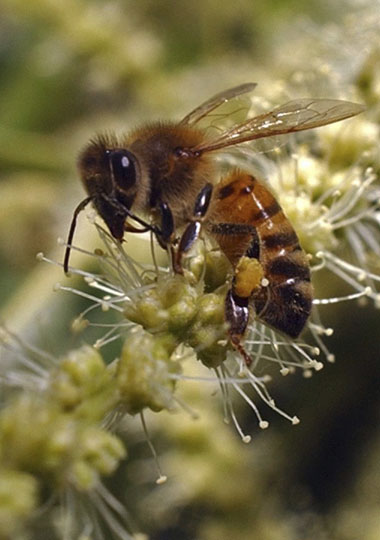tags: honeybees, insects, agribusiness, colony collapse disorder, CCD
Contrary to what the cell phone alarmists would have you believe, a team of scientists recently identified a virus and a parasite that might be the cause of the recent and sudden collapse of honeybee colonies throughout the United States and Europe. The team, from Edgewood Chemical Biological Center and University of California San Francisco, used a new technology, the Integrated Virus Detection System (IVDS), which was designed for military use to rapidly screen samples for pathogens. This technology revealed the presence of a viral and a parasitic pathogen that may be contributing to the honeybee loss.
During the previous year, bee keepers and other experts have observed tremendous declines in honeybee populations -- often entire colonies disappear suddenly and without warning, a situation referred to as "collapse" so scientists refer this phenomenon as "Colony Collapse Disorder" or CCD. Thus far, approximately 50 percent of bee hives have collapsed in this manner. As a result, experts fear that this loss of honeybees will have an enormous horticultural and economic impact around the world, leaving important food crops such as fruits, vegetables, and almonds unpollinated, so they are working hard to find the cause of this mysterious syndrome, and this cutting-edge technology might have provided them with an answer.
It is still possible that other factors, such as pesticides, inadequate food supply or inbreeding of the bees, are playing contributing roles to the loss of bee hives. According to a bee keeper source of mine, bee losses are not unusual. In the past, significant numbers of bee colonies have been killed by incliment weather, pesticides and infestations by pests, especially the Varroa mite.
Cited press release.
See also; UCSF story.
And see also; LATimes.
- Log in to post comments



Makes one appreciate native bees. In March Dr. Jack Neff of the Texas Mellitological Institute addressed the Houston NABA chapter and commented that, if European honeybees disappeared, American native plants would not even take notice. Portable beehives placed during a temporary cessation in insecticide applications have been too long a staple of American agribusiness.